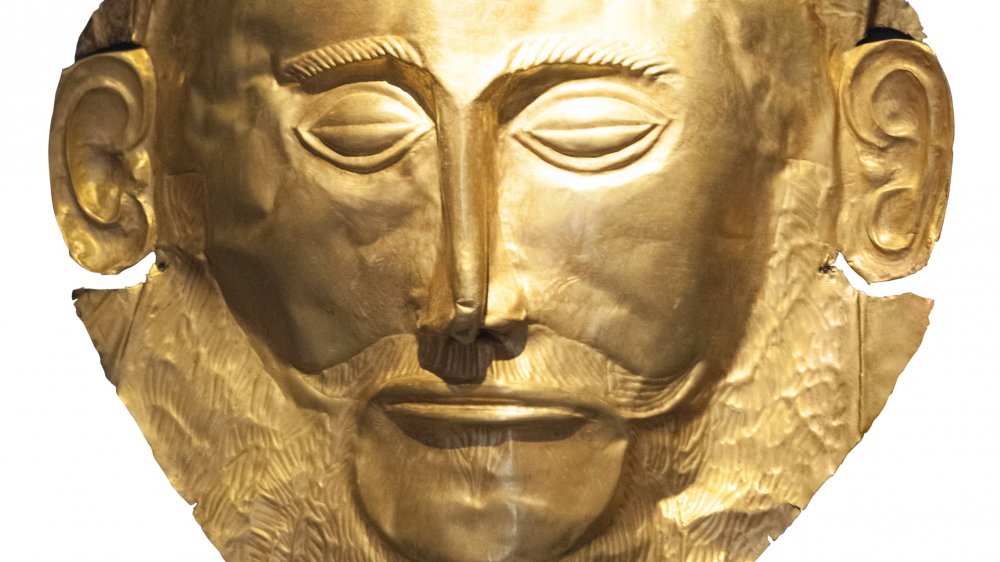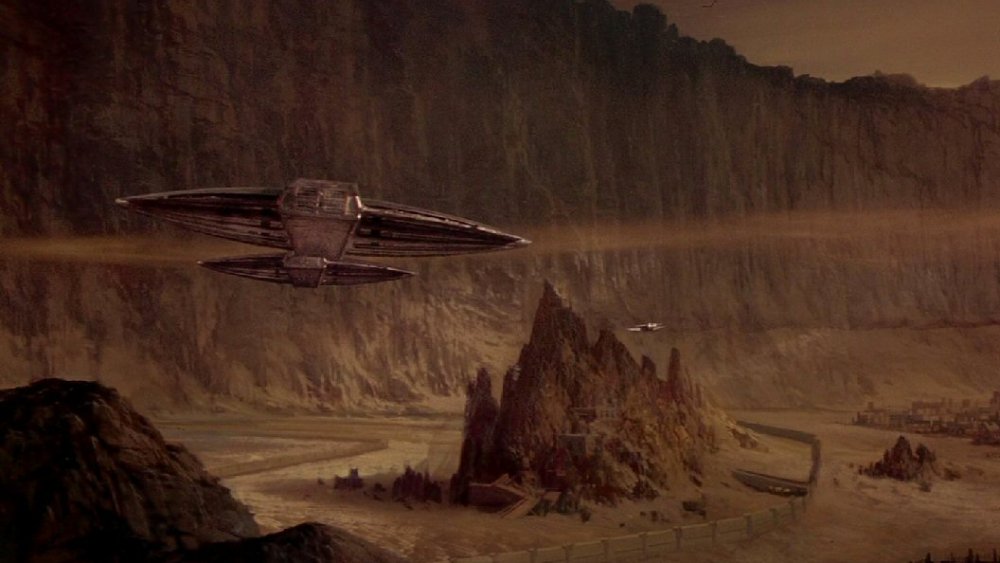The Entire History Of Dune's House Atreides
Dune is a story about a lot of things. Indigenous land rights, rapacious capitalism, the right to rule, and the foundations of religion all get their time to shine in Frank Herbert's mystical sci-fi epic. But if you really boil down the legendary series all the way to its core plot elements, Dune is the story of one powerful family. Over the course of six books (more, if you count the books written by by Herbert's son, Brian), readers watch the entire galaxy become reshaped by the actions of House Atreides.
This one imperial house sets off a revolution and holy war that lasts thousands of years. The schemes and plots leveled against them are more numerous than the stars in the sky. What starts with a single, storied Atreides son eventually changes the outermost reaches of the known universe. We can think of few better ways to grasp the massive scope of Dune than looking at its story through the lens of genealogy. This is the history of House Atreides and their place in Dune's star-spanning saga, for newcomers and Fedaykin alike.
Origins
It is said that the Atreides clan can trace their lineage back to the mythical King Agamemnon. Though this is likely a commentary on the murky timelines and specious claims of our own earthly blue-bloods, it's a claim worth investigating. A major player in the Trojan War who appears in the Odyssey and the Iliad, among other epic works, Agamemnon was the son of King Atreus, from which "Atreides" is derived. Because of their supposed connection to Agamemnon, many mythological Greek figures are counted as being part of the Atreides family tree, including Orestes, Menelaus, and Clytemnestra.
This connection to legendary kings, queens, and heroes is apparent in the way the Atreides family carries themselves. Agamemnon led the Greek armies against Troy, and the Atreides of Dune are similarly warlike. While they seem, at first glance, to maintain a balance with nature and a healthy fear of industrialization on the planets they control, make no mistake: Their armies are still feared as fierce and accomplished fighters. They fight often enough to have created their own battle language, a cryptographic series of hand signals to be used in conflict. Just as their ancestor commanded legendary forces in the ancient world, so too do they in the stars.
Life on Caladan
By the time readers meet the Atreides family of Dune, they are far away from Greece (and god-kings, though that will come back around). After centuries of struggle between galactic fiefdoms, the universe has fallen under the control of the Galactic Padishah Empire. The Emperor controls the known universe through an arrangement with major houses like the Atreides, assigning them control over entire planets and giving them a modicum of power in a governmental body called the Landsraad. Though the days of outright war between the houses are over, the Landsraad members frequently compete with one another for control of resources and the favor of the Padishah Emperor.
House Atreides oversees Caladan, a lush planet covered in forests and seas. They are fair rulers who take conservatorship of their planet very seriously. The people of Caladan are largely satisfied and well-cared for on their planet, living in harmony with nature. The Atreides family is forced to leave their homeworld behind, however, when the Emperor commands them to take control of the desert planet, Arrakis. Colloquially known as Dune, this hostile planet is a desert world where water is punishingly scarce. Humans have lived on the planet for centuries, since practitioners of the Zensunni religion fled to the far-flung and forgotten planet to avoid persecution. These settlers became the inhabitants of Dune known as the Fremen. They have adapted to the planet's harsh surface by living underground and building a society geared towards the conservation of water.
A double cross
The Padishah Empire's interest in Dune is piqued by the discovery of a critical resource: The planet is the only known source of the spice melange, a fragrant commodity found under the sand, that gives people who ingest it mild prescience. The "spice," as it is known, is a crucial component of religious ceremonies and light-speed navigation, and its highly addictive nature leaves the Empire with no choice but to take control of the planet.
Prior to the Atreides' arrival, the planet was ruled by the Harkonnens. Long-time rivals of the Atreides, the Harkonnens are ruthless and greedy, their homeworld having been turned into a smog-choked hell in service of increasing profits. The Harkonnens launch a plot with the Emperor to take down the Atreides, who are wildly popular leaders that the galactic ruler sees as a threat to his own throne. The Harkonnens' time on Arrakis allows them to set traps for the incoming family. Ideally, in the Emperor's mind, this will make the defeat of the Atreides look like inter-house rivalry. He loans his incredibly gifted force of soldiers and disguises them in Harkonnen uniforms.
Taking to the desert
Sympathetic people within the conspiracy warn the Atreides family of the trap laid for them. Duke Leto Atreides and many of his men are killed in the attack, but his son Paul and Paul's mother, Jessica, are able to escape. Both Paul and Jessica have been trained in the ways of the Bene Gesserit, and use their powers of observation and coercion to survive in the desert.
Paul is eventually taken in by a band of Fremen. They are initially wary of Paul and Jessica, but their gifts of prescience, courtesy of the spice, and Paul's unique abilities collide with prophecies seeded among the Fremen by Bene Gesserit missionaries. Paul's goals to take back the planet coincide with the Fremen's belief that they will someday rise up and overthrow exterior control of their home. As Paul and Jessica learn to survive in the desert, word of Paul's god-like powers spread among the Fremen, and a plot is hatched to cast out imperial forces.
An abomination
Jessica's arrival among the Fremen is particularly well timed. She has been trained in the ways of the Bene Gesserit, an order of women who secretly pull the strings of galactic power. Their leaders are known as Reverend Mothers, and the Fremen's own Reverend is nearing the end of her life. The Fremen believe Jessica would make a suitable replacement, but to become a Reverend Mother, one must drink the Water of Life, a poison derived from the sandworms who live on Dune. High-level Bene Gesserit members have such intense control of their bodies that they can isolate the poison inside themselves and render it harmless. If they fail, they die. If survived, however, the Water of Life opens up a mental pathway, connecting the survivor to the memories of all the Reverend Mothers who came before her.
Jessica is pregnant when she undergoes the Water of Life ceremony. As a result, her unborn daughter Alia absorbs this knowledge alongside her mother. The Bene Gesserit know that people born with this knowledge already awakened before they can form personalities of their own are uniquely unstable. They view these children as deeply cursed abominations. Jessica and Paul refuse to cast her out, and Alia becomes an incredibly important figure in the years following her older brother's crusade.
Reclaiming Dune
Time in the desert proves to be useful. Having been shaped by their uniquely dangerous landscape, the Fremen are some of the fiercest fighters in the galaxy. Paul sees in them a resource that can be used to take on the Emperor's universally feared soldiers. He trains the Fremen in Atreides battle techniques and the body control of the Bene Gesserit, creating a desert-wide army of super-soldiers. Together, they prepare for an attack on the planet's imperial capital, Arrakeen.
During his time outside of the Empire's reach, Paul also realizes the unique power the controller of Dune wields: They are the controller of spice production, the most coveted resource in the world, necessary for travel between planets, and highly addictive to boot. Whoever controls the spice controls the entire universe. Thus, Paul uses a dual strategy of direct attack and threat to the production of spice to bring down the Galactic Empire.
Paul sets up his soldiers in the desert outside Arrakeen, using a storm as cover. When the storm lifts, they launch a brutal assault on the capital. To keep imperial reinforcements off the planet, Paul threatens to destroy the spice, something all space navigators require to do their jobs — and keep on living, as withdrawal can be fatal. The Emperor concedes control to Paul, and he launches a cosmic Jihad to bring all known worlds under his rule.
Betrayals
After Paul becomes the Emperor, the gospel of Paul Atreides begins to grow. The capital of Arrakeen becomes a holy city, with churches and cults based around Paul and his sister Alia. But though the Empire continues to expand, rot sets in back home. Fremen veterans become disillusioned with Emperor Atreides' cause. Terraforming has begun on Dune to make it a more habitable planet, and the old ways of water conservation are slipping. As they return home from war to foreign suburbs of the capital built for them as a stipend, they look around and see their planet growing soft and strange. Ultimately, powerful forces that had been embarrassed by Paul's sudden rise exploit this discontent and hatch a plot against the Emperor.
Emperor Atreides is blinded by a nuclear attack on Arrakis, but retains his ability to see via his incredible gifts of prescience. The Emperor's blindness further rankles his Fremen followers, however, who expect people who have been blinded to walk into the desert to die, rather than burden their tribe. After fathering two children with Chani, Paul allows himself to die in the traditional fashion, solidifying his status as a god-like figure among his subjects and Fremen followers alike.
Eternal reign
Paul's sister Alia takes on the duties of running the Atreides Empire, expecting to serve as regent until Paul's children grow to adulthood. The "pre-born" sister can see that this is somewhat unnecessary, as Ghanima and Leto II Atreides were born with genetic memories much like her own. Alia pulls power to herself rather than turn the throne over, creating her own cult and surrounding herself with die-hards. Eventually, however, her own strange birth catches up with her. Her unstable personality succumbs to one of the countless other selves in her memory, and she begins to be possessed by Atreides enemy Vladimir Harkonnen. When a mystical preacher from the desert appears, believed to be her brother, the Harkonnen-Alia fears her rule will be overturned and orders his death.
Leto II, who has been living among the Fremen, returns from his self-imposed exile and orders Alia to stand trial for crimes against the Atreides Empire. She breaks free of Harkonnen's hold long enough to commit suicide. Leto II has discovered a path for all humanity, which he gets rolling following Alia's death. He forces the development of humanity across his Empire to suit this goal. He reigns for 3,500 years before realizing that he ultimately must die for the next stage of humanity to develop.
Calling it quits
Leto II sets about preparing for his death. He carries on the Atreides bloodline via distant relatives, despite the fact that many of them have no idea they're part of the legendary house. He reverses the complete terraforming of Dune, returning it to the harsh desert it once was. Finally, he allows himself to die in an ambush, thereby ending the Atreides Empire.
In the chaotic period following the death of Leto II, his Empire fractures and splits into millions of independent worlds. The galactic economy falls to pieces and worlds become isolated from one another. This leads to brutal famines on planets that were dependent on the rest of the Empire for food, and splits opinion on the late Emperor. This is all part of Leto II's plan. He foresaw a threat coming from outside the empire — from outside humanity entirely, in fact. This threat will require many different ways of thinking and living to survive. "The Scattering," as this period becomes known, forces the further evolution of humanity, so that humanity might survive. The planets that survive indeed flourish on their own unique terms, and the galaxy continues, into infinity.









